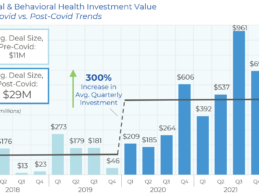The prevalence of mental and behavioral health conditions has been on the rise in recent decades, further aggravated by the pandemic in the last two years. Social isolation, grief from the loss of loved ones, fear of contracting the virus, and financial worries were all major stress factors that increasingly affected the mental wellbeing of the population, and the resulting statistics are startling: the average share of adults with symptoms of anxiety or depressive disorders jumped from 1
Read More
Health IT & Digital Health-Opinion | Op-Eds | Guest Columns | Analysis, Insights - HIT Consultant
How Can We Reduce Clinician Burnout? Improving Patient and Caregiver Engagement
Even as we (hopefully) approach the tail-end of the latest COVID-19 wave, one growing healthcare challenge continues to worsen: clinician burnout. Nurses, physicians, schedulers, and other members of care-provider teams continue to post rising rates of burnout. They’re feeling overwhelmed and underappreciated due to factors such as hectic workplaces and schedules, extended workloads, and excessive administrative tasks. This is an alarming trend that the entire healthcare industry needs to be
Read More
Patient Engagement: 3 Lessons Learned from Consumer & Service Industries
If there’s been a constant in healthcare the past two years, it’s been in the rapidity of change, largely in response to the Covid-19 pandemic. Suddenly, healthcare needed to adopt new work models and technologies to provide proper patient care. No wonder healthcare ranked atop all other industries in “new ways of working and processes,” “new tech tools and infrastructure,” and “new staff wellbeing practices,” in a recent survey of 1,200 business leaders.
Inevitably, healthcare organizations
Read More
Digital Documentation: How PDFs Can Help Providers Expedite Care
We live in an increasingly digital world. Across industries, companies and consumers have come to rely on the rapid exchange of digital information. Healthcare, however, has been an outlier in this regard. While the healthcare digital transformation has been in play for years, it’s still taken longer for the paradigm shift to gain momentum.
Healthcare stakeholders have long relied on paper-based processes. From documenting clinical care to filing medical claims and registering patients, paper
Read More
Coping with Crises: Using Telemedicine to Deliver Effective Virtual Critical Care
The COVID-19 pandemic has proven that telemedicine is essential for keeping the healthcare system running during a crisis. How can virtual critical care keep improving to help providers manage future emergency events?
In early 2020, as the nation’s healthcare system almost buckled under the weight of the COVID-19 pandemic, providers searching for a way to stay connected to their patients turned to telemedicine. Primary care providers and specialists embraced virtual care, thanks to a
Read More
Mental Health Awareness is Everywhere. Why Shouldn’t Virtual Care Be Standard?
May is Mental Health Awareness Month, which for years has been a platform to increase understanding about mental illness and advocate for better mental health care. Now more than ever, you don’t have to look too hard to see that mental health is a daily fixture in the national conversation. Unfortunately, mental health issues have become far too common for people of all ages and in all walks of life.
An Influx of Demand from Pediatrics to Geriatrics
We know that children are in dire
Read More
Raising Clinical Outcomes and Engagement Through Healthcare Equity: What Health Plans Need to Know
Structural racism and poverty are correlated with a higher incidence of obesity among Black Americans (49%). Social drivers of health, which impact a disproportionate number of non-white Americans who live below the poverty line, account for as much as 90% of individuals’ health outcomes.
These are just two examples of data that highlight the need for equity.
Health plans are well-aware that shifting this dynamic and boosting clinical outcomes is possible through better,
Read More
How the Life Sciences Industry Can Boost Diversity and Inclusion Efforts
Although it is well established that diversity improves outcomes and drives excellence, implementing diversity lags behind in many industries, including life sciences and healthcare.
Diversity is lacking across the entire field, from academic research to clinical work, composition of the workforce, and medical practice. This leads to worse health outcomes and fewer professional opportunities for underserved demographics, such as racial and ethnic minorities, women, and people with
Read More
Can Automation Drive Health System Outcomes?
The United States spends about $1 trillion per year on healthcare administration. 95% of healthcare workforce growth since 1990 has been administrative. But adding administrative staff hasn’t helped health systems stay on top of the increase in manual work queues, and it certainly hasn’t been improving outcomes for patients. So when asked if automation can drive better health system outcomes, through my work in healthcare technology, I know for a fact that it already is.
Research has
Read More
What’s The Role of Digital Health in Public Health?
To a certain extent, the national conversation about the importance of a robust public health system has been happening for the last couple of years in the context of dealing with the COVID-19 pandemic. And yet, rather than discussing how the system can be strengthened and expanded, we’ve instead largely limited it to what the government can and cannot ask the public to do, as though the necessity of a public health system is still in doubt.
For those who work in the arena, this is not an
Read More










